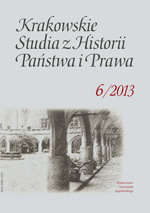Artykuł recenzyjny książki Jana Sowy Fantomowe ciało króla. Peryferyjne zmagania z nowoczesną formą, Universitas, Kraków 2012
Review of Jan Sowa’s book The Phantom Body of the King. Peripheral Struggles with Modern Form, Universitas, Cracow 2012
Author(s): Izabela Lewandowska-MalecSubject(s): Review
Published by: Wydawnictwo Uniwersytetu Jagiellońskiego
Keywords: absolute monarchy; Nobles’ Democracy; Polish-Lithuanian Commonwealth; Partitions; underdevelopment
Summary/Abstract: The main thesis of the book reviewed is an assumption that Poland and other countries of East-Central Europe suffer from a chronic underdevelopment, whose sources the Author is trying to find in the past. The review focuses on one of the two main themes of the book, i.e., leaving out the economic issues, it concentrates on the politics. The Author sets out to claim that only those countries develop correctly which have experienced absolute monarchy in their history. Referring to the idea of Ernst Kantorowicz, Jan Sowa assumes that such a political system is the only guarantee of stability and continuity of a country: on the death of the “physical body” of the king, his “political body” continues to last. In Polish-Lithuanian Commonwealth, because of the elective character of the monarchy and the claims of the nobility to play the role of the sovereign, the “political body” disappeared, and the country turned out to be a “phantom body.” For the Author, this means an atrophy of the country following the death of the last Jagiellonian king, Sigismund II Augustus. Between 1572 and 1795 there is no Polish statehood, since the Author regards the Polish-Lithuanian Commonwealth as only an “illusion.” Both the theories presented above and the sources used to prove their correctness raise substantial doubts. The Author confuses basic notions, identifying sovereignty with absolutism, and he makes basic historical mistakes, regarding the Jagiellons’ throne in the Crown of the Kingdom of Poland as hereditary, and also assuming the factual decay of statehood as early as in 16th century, with its symbolic confirmation in 18th century. He finds the grounds for his theories in political theology and psychoanalysis, using historical and legal historical sources to a very limited extent
Journal: Krakowskie Studia z Historii Państwa i Prawa
- Issue Year: 6/2013
- Issue No: 3
- Page Range: 285-301
- Page Count: 17
- Language: Polish

